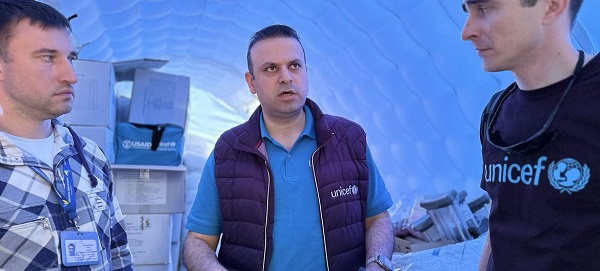Anjali Sharma
GG News Bureau
UNITED NATIONS, 23rd May. UNICEF on Wednesday expressed concerns about the fresh fighting along the frontline in Ukraine has driven thousands of civilians from their homes and villages near Kharkiv, close to the Russian border.
Some are children with disabilities along with orphans all of whom are showing signs of extreme trauma, the agency said.
According to UN agencies, those evacuated are staying at camps for the internally displaced and being given vital assistance by UN agencies.
Munir Mammadzade, UNICEF Representative in Ukraine, who has been in the region, where a Russian advance has driven thousands towards the main city in search of relative safety.
He described the dire situation and the assistance needed in the immediate and longer term.
Munir Mammadzade said 11,000 people have been evacuated from the front areas, mostly to Kharkiv City.
He visited the humanitarian hub where those evacuated by the government and volunteers are being registered and accessing services offered by UNICEF and other humanitarian organizations.
Children are among those evacuated and require dedicated and specialized support.
In the humanitarian hub, UNICEF has established a child-friendly space.
The agency is supporting children in foster families because they are more vulnerable than others.
There are children with disabilities and children who live with disabled parents. Some children were evacuated to the IDP centre.
He said that the situation is very difficult.
Immediate needs are being addressed thanks to the collective response of the UN and partners on the ground. There are many challenges that need to be addressed in the medium and long term.
Each and every relocation or displacement is a lifetime trauma for these children.
They have been traumatized since the escalation of the war. The frontline areas are regularly attacked and shelled. They were already experiencing mental health problems and required support.
They have limited access to education, relying only on online or distance learning.
Children will need immediate and long-term arrangements, such as learning opportunities, growth and development support and access to health services. The immediate needs are being addressed and that displaced people and civilians may not be able to return to their homes.
Host communities will need long-term solutions, but for humanitarians, our resources do not allow for systemic, long-term interventions. We foresee major challenges for over 100 vulnerable children without parental care who live with foster families, he added.
They need to be relocated and are getting used to new foster family arrangements without their support network.
There are challenges associated with the services that children rely on, including energy, water and heating infrastructure, which are currently dysfunctional and may continue to be so in the future.
The major challenge for them would be to accept the new reality and the fact that they cannot return because now the infrastructure that civilians rely on is not there.
Munir Mammadzade said that their houses are destroyed. It is too early for them to accept that fact and realize it all the challenges that they will be going through. Of course, on the ground, we and humanitarian partners are providing psychosocial support.
He concluded that the longer they stay in IDP camps, the more difficult it will be for them to cope.


Comments are closed.